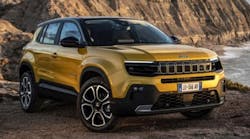Stellantis, Ford Ink More Battery Supply Deals
Automotive giants Stellantis NV and Ford Motor Co. this week announced agreements to bolster their electric vehicle battery supply chains, adding to a land rush for critical materials.
Ford is scaling its EV production with two agreements for lithium hydroxide, one of the main ingredients in EV batteries. The first is with Albemarle Corp., which will provide Ford with 100,000 metric tons of battery-grade lithium hydroxide, enough for about 3 million EV batteries. The companies’ contract will run from 2026 through 2030 and executives also are exploring options to develop a closed-loop solution for lithium-ion battery recycling.
Ford’s other deal is with Nemaska Lithium for a supply of lithium products over an 11-year period that includes up to 13,000 tons of lithium hydroxide per year. Before that, though, Nemaska will supply Ford with spodumene concentrate. The lithium hydroxide and spodumene will come from its Bécancour and Whabouchi mines, respectively, in Québec, Canada.
“We are at a significant moment in Ford’s next industrial revolution for the EV age," said Lisa Drake, vice president of EV industrialization in Ford’s Model e division. "Working with strong global collaborators […] helps us fortify and de-risk our plans for sourcing the key minerals we need to make EVs more accessible for our customers longer-term.”
Leaders of Stellantis, the parent of Chrysler, Jeep and more than a dozen other brands around the world, meanwhile said they have invested in California-based materials firm Lyten Inc., which is developing a lithium-sulfur battery technology among other things. Terms of the investment, which was made via Stellantis’ year-old roughly $300 million corporate venture fund, aren’t being disclosed.
Eight-year-old Lyten is headquartered in Silicon Valley and working on a range of applications centered on its patented 3D graphene material that is engineered from natural gas. For Stellantis, the company’s LytCell lithium-sulfur battery promises a carbon footprint 60% smaller than other batteries because it doesn’t use nickel, cobalt or manganese and can be regionally sourced and produced.
“We walked away impressed by the potential of this technology to help drive clean, safe and affordable mobility,” Carlos Tavares, Stellantis’ CEO, said in a statement. “Lyten’s Lithium-Sulfur battery has the potential to be a key ingredient in enabling mass-market EV adoption globally, and their material technology is equally well positioned to help reduce vehicle weight.”
Tavares and his team have laid out EV targets as ambitious as those of their big-auto peers. Among them is having Chrysler’s lineup be fully electric by 2028 and having one of every two Jeep sales be electric in 2030. The company early this year said it had invested in Australian company Element 25 Ltd. as part of a deal to source manganese for battery packs.
Peter Maithel, automotive industry principal at consulting firm Infor, said the announcements highlight the pressure many automotive companies face to secure their lithium supplies now for future EV demand, a trend that is pushing prices higher. Automakers also have to contend with ethical sourcing dilemmas and the availability of lithium, as many mines have yet to scale production to meet the production needs.
“As the lithium rush gains a foothold, it’s important for automakers and suppliers to act quickly and collaboratively to align their volume aspirations with supply constraints and market realities, while simultaneously ensuring that they are strategically positioned to meet current and evolving sustainability mandates,” Maithel said.
About the Author
Geert De Lombaerde
Senior Editor
A native of Belgium, Geert De Lombaerde has been in business journalism since the mid-1990s and writes about public companies, markets and economic trends for Endeavor Business Media publications, focusing on IndustryWeek, FleetOwner, Oil & Gas Journal, T&D World and Healthcare Innovation. He also curates the twice-monthly Market Moves Strategy newsletter that showcases Endeavor stories on strategy, leadership and investment and contributes to other Market Moves newsletters.
With a degree in journalism from the University of Missouri, he began his reporting career at the Business Courier in Cincinnati in 1997, initially covering retail and the courts before shifting to banking, insurance and investing. He later was managing editor and editor of the Nashville Business Journal before being named editor of the Nashville Post in early 2008. He led a team that helped grow the Post's online traffic more than fivefold before joining Endeavor in September 2021.
